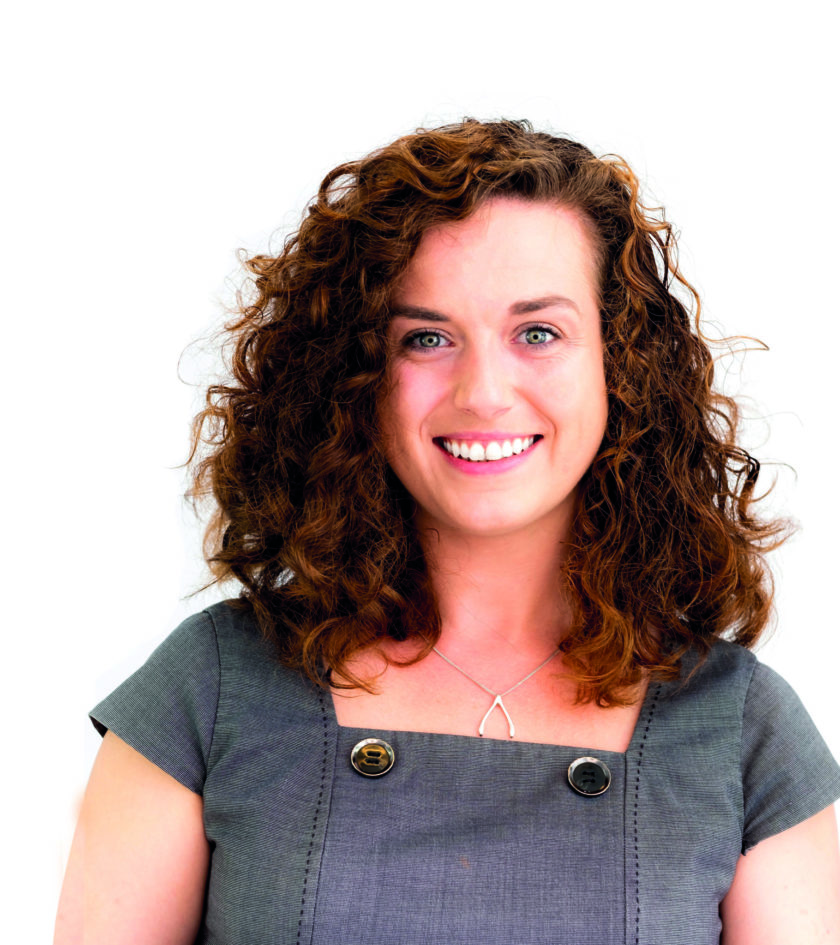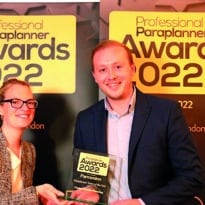Getting involved, asking questions and stepping outside her comfort zone is the way Aishling Costello, paraplanner with Fidelius Group, has progressed her knowledge and experience, she tells Rob Kingsbury
If there is one piece of advice Aishling Costello, paraplanner with Fidelius, would give someone starting in paraplanning it is: “Get involved as much as you can and ask as many questions as you can think of – because you will learn so much from it.”
It’s advice she has heeded herself in her career within financial services, first as an administrator and for over five years now, as a paraplanner.
Like many people in financial services, it wasn’t her planned career path. Growing up, horses were her love. “I used to compete at show jumping, dressage and eventing at various levels until I left university.” She graduated with a degree in Equine Science. “It was a great course; a really good mix between lectures, labs and practical, including dissecting horses’ heads and legs.” But not wanting to do four more years of studying to become a vet, Aishling looked for a job close to home and landed a role as an administrator with an IFA/accountancy firm.
“I didn’t understand what an IFA firm did when I joined but I started working in various parts of the business, in any area they wanted me to work, and in each one I asked questions, which quickly built up my knowledge. Over the two-and-a-half years that I was there, I progressed into doing the research for the paraplanners and then into paraplanning itself.
“And I’ve never looked back. Paraplanning turned out to be my calling and when I looked to move jobs I looked for a full-time paraplanning role.”
That role was in the Bridgwater office of Chartered Financial Management – which was recently acquired by Fidelius Group – where she has been for the past five years.
The group provides financial planning to individuals and employee benefit advice to companies. It has over 100 employees, including 30 financial planners and employment benefit consultants, with around £1.2billion in assets under advice.
In the Bridgwater office, there are six financial advisers and four paraplanners. The firm’s directors have dedicated paraplanners and the remaining paraplanners operate on a pooled basis for the other advisers, although Aishling says she tends to work mainly with one adviser “because she is very, very busy”. The firm operates a buddy system, so when a paraplanner is away there is someone available who can take over the workload.
Describing her responsibilities as a paraplanner, Aishling says it is “supporting the adviser with anything they need to serve the client; so it is not simply report writing. My job includes the usual paraplanner responsibilities, ensuring we research and recommend the most appropriate advice. The financial advisers will provide ideas for the recommendations and then the paraplanners will do the research and calculations and discuss any other areas of planning that may not have been considered or that may need to be amended as the client’s information has come to hand, and then we’ll write up the recommendations and follow things through to implementation.”
Generally, paraplanners do not attend the client meetings with the adviser, unless the adviser thinks they can add value or support for a particular individual, she explains.
“On top of that, I like to get involved in the business. So I’m involved in project work, for example, looking at the processes and systems to see how things can be made to run more smoothly and improved to deliver a better client outcome. I’ll get involved in any part of the business, from trialling new research tools and cashflow forecasting tools, to working on report templates.”
Impact of Covid crisis
Aishling says as she was working three days a week at home pre the Coronavirus crisis, she has been into the office only two or three times since the initial lockdown in March 2020. “There’s really been no real need for me to go in but the option has been there to do so, from July to 4 November, in a safe way and only two people at a time.”
When the first lockdown was announced the firm responded extremely well, Aishling says. “Fidelius made sure we were all set up to work from home straight away, providing anything we needed to ensure we could work comfortably.
“Our advisers are mainly home/field based, so as paraplanners we were used to working with them remotely and when lockdown came in we simply scaled up the number of people we work with remotely.
“We keep in contact through video calls, using Teams or Zoom, and we have regular communications with the operations team and managers, who let us know how the company is doing, any changes we need to know about, and updates on the Covid situation. We also have bi-weekly drop-in forums where anyone can asks questions of the management. Fidelius is very open like that, they want to know staff opinions and to do right by staff as well as our clients.
“On a more informal basis, we have Friday socials, including fancy dress and charity fund raising events.
“All the work that has gone on has made the adjustment to what is a very unusual situation much easier to deal with.”
Cashflow project
One of the projects that Aishling was involved in was due diligence on a new cashflow forecasting system the company was looking to use – i4C.
This was before i4C was acquired by Intelliflo to sit alongside the Intelligent Office back-office system, which Fidelius also uses. The group also uses the Cashcalc cashflow tool.
“Myself and a couple of the other paraplanners were tasked with looking at how we’d use i4C and how we could adopt it into the overall service proposition. I worked very closely with i4C for quite a long time asking them a lot of questions, getting to grips with the system and making sure we were making use of the tool to its full capability.
Having been so intimately involved in the testing of the system for the company, i4C asked Aishling to take part in the Professional Paraplanner Technical Insight Webinar presented by the company in the summer of 2020, to give a paraplanner’s view of the system.
“It was a great experience, although I was really nervous beforehand – my hands were shaking. But my view is that if you don’t try something new, you stagnate. And I think that is particularly true of paraplanners. I think you need to try new things and get out of your comfort zone because that’s the way you learn and develop.
“I think that cashflow is becoming more and more appreciated and essential and it won’t be long before all advisers are undertaking some sort of cashflow forecasting for their clients.”
Why become a paraplanner?
Aishling sees the role of paraplanner become ever more core and influential within advice firms.
“Paraplanning is becoming less of a stepping-stone to becoming a financial adviser and more of a career in its own right, and financial planners appreciate the ability to rely on paraplanners and the technical knowledge they bring to the table.
“This is important because it means people develop their skills and ongoing professional development to the role of paraplanner rather than focusing their skills on being an adviser,” she says.
She sees the paraplanning role as “a great opportunity for people who are analytical and who also want to contribute in a meaningful way to the client proposition, because you are directly working with the adviser and the client.
“If you are that analytical kind of person who likes problem solving and thinks outside the box, who enjoys doing research and process-driven work and is able to sort and analyse large quantities of information while paying attention to detail, then paraplanning is for you.”
For anyone who is starting out in the industry and is looking at paraplanning as a career Aishling has three tips:
1. Find an employer who will support your study and your learning because it makes all the difference.
2. A lot of the knowledge you get is only through doing the job, so put yourself forward for everything you can.
3. Listen and learn. Seeing how clients, providers and colleagues interact will help you better understand what’s needed.
She adds: “The support I’ve had from my colleagues and my employers has helped increase my development and my confidence tenfold. It’s those conversations that really help grow your knowledge. So do ask questions and do get involved because in my experience that is the way to improve and develop your ability to be a paraplanner.”




























